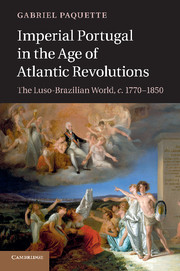Crossref Citations
This Book has been
cited by the following publications. This list is generated based on data provided by Crossref.
Ferreira, Roquinaldo
and
Hébrard, Jean
2014.
Le genre biographique comme histoire sociale : la famille Ferreira Gomes dans l’Atlantique sud du xixe siècle.
Brésil(s),
Vol. 6,
Issue. ,
p.
143.
Dominic, Lieven
2014.
INTERNATIONAL RELATIONS IN THE NAPOLEONIC ERA: THE LONG VIEW.
Novosibirsk State Pedagogical University Bulletin,
Vol. 4,
Issue. 6,
p.
102.
Hausser, Christian
and
Pietschmann, Horst
2014.
Empire. The concept and its problems in the historiography on the iberian empires in the Early Modern Age.
Culture & History Digital Journal,
Vol. 3,
Issue. 1,
p.
e002.
PAQUETTE, GABRIEL
2015.
ROMANTIC LIBERALISM IN SPAIN AND PORTUGAL, c. 1825–1850.
The Historical Journal,
Vol. 58,
Issue. 2,
p.
481.
Lieven, Dominic
2015.
Russia and the Napoleonic Wars.
p.
12.
Meléndez, Mariselle
and
Stolley, Karen
2015.
Introduction: Enlightenments in Ibero-America.
Colonial Latin American Review,
Vol. 24,
Issue. 1,
p.
1.
Reinert, Sophus A.
2015.
A Companion to Intellectual History.
p.
402.
BARTELSON, Jens
2015.
Ending Empire: Lusotropicalism as an imperial ideology.
Relaciones Internacionales,
p.
11.
O'Rourke, Shane
2016.
The Encyclopedia of Empire.
p.
1.
Caruso, Amerigo
2017.
Il dibattito in occasione dei 200 anni dal Congresso di Vienna: tra storia globale e teorie del moderno.
SOCIETÀ E STORIA,
p.
167.
Vargas, Carlos
Sarmento, Cristina
and
Oliveira, Patricia
2017.
Cultural networks between Portugal and Brazil: a postcolonial review.
International Journal of Cultural Policy,
Vol. 23,
Issue. 3,
p.
300.
Domingues da Silva, Daniel B.
2017.
The Atlantic Slave Trade from West Central Africa, 1780–1867.
Mulich, Jeppe
2017.
International Origins of Social and Political Theory.
Vol. 32,
Issue. ,
p.
181.
Luengo, Jorge
and
Dalmau, Pol
2018.
Writing Spanish history in the global age: connections and entanglements in the nineteenth century.
Journal of Global History,
Vol. 13,
Issue. 3,
p.
425.
Goodman, Glen S.
2018.
Consuming thecafé colonial: German Ethnicity and Tourist Migrant Marketplaces in Southern Brazil.
Global Food History,
Vol. 4,
Issue. 1,
p.
40.
Franco, Matthew E.
2018.
Markings on the map and pillars in the land: the legacy of Spanish imperial geography.
Journal of Iberian and Latin American Studies,
Vol. 24,
Issue. 2,
p.
255.
Vicent, Andrés María
2019.
Novelty, selfishness and independence: Spanish political culture in the face of foreign credit (1833-1845).
Journal of Iberian and Latin American Studies,
Vol. 25,
Issue. 3,
p.
403.
Domingues, Ângela
2019.
Museus, coleccionismo e viagens científicas em Portugal de finais de Setecentos.
Asclepio,
Vol. 71,
Issue. 2,
p.
p271.
Sparks, Randy J.
2020.
On the frontlines of slave trade abolition: British consuls combat state capture in Cuba and Mozambique.
Atlantic Studies,
Vol. 17,
Issue. 3,
p.
327.
Paquette, Gabriel
2020.
Demotic and “democratic” languages in post-independence Brazil, 1822-48.
Journal of Iberian and Latin American Studies,
Vol. 26,
Issue. 2,
p.
149.



